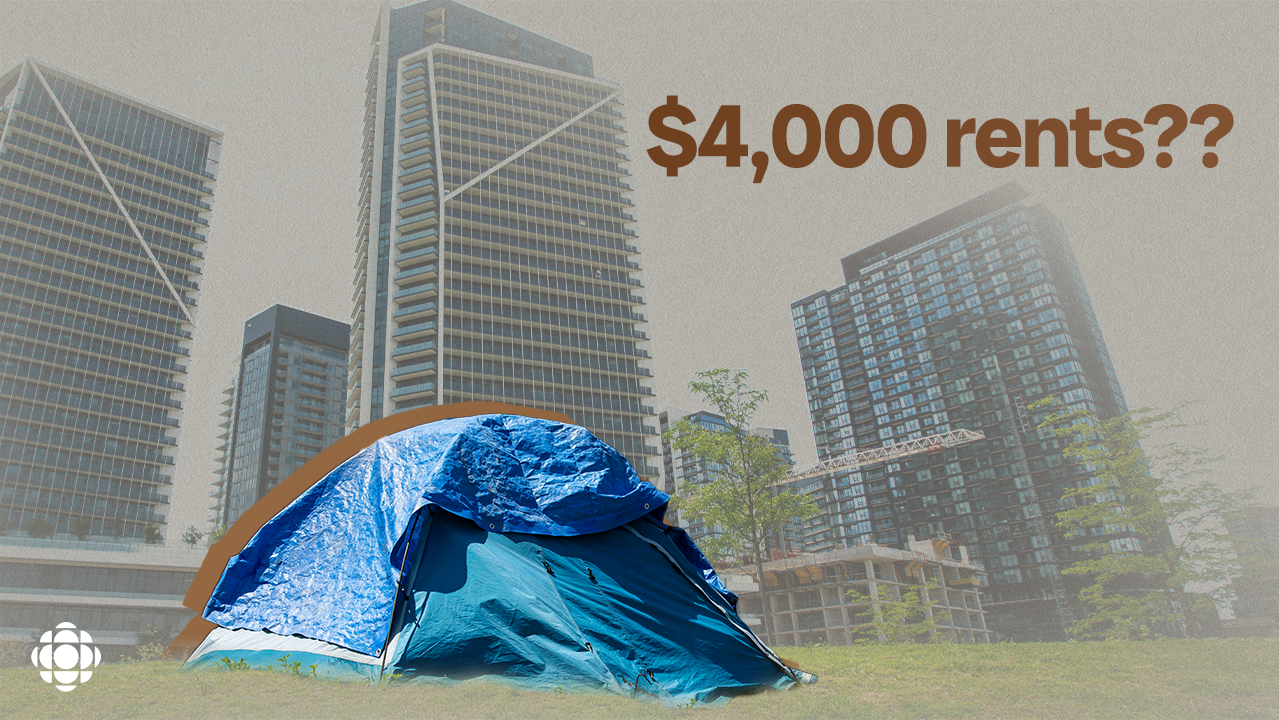Fines not high enough to protect tenants, say advocates.

Ontario’s Landlord and Tenant Board issued 11 fines in nearly four years for bad faith evictions — but tenants’ lawyers say that number is staggeringly low and reflects a failure by the province to protect tenants.
CBC Toronto obtained the number of fines from the Landlord and Tenant Board. Nearly all of the 11 fines issued from January 2020 to the end of September 2023 amounted to less than $3,000 per landlord with two exceptions.
One fine was issued for $5,000 and another was fined $10,000.
Those fines fall far below the maximum of $50,000 for bad faith evictions under the Residential Tenancies Act, the provincial legislation that outlines tenants’ and landlords’ rights and responsibilities.
“I’m not surprised that the number is so low,” said Samuel Mason, a lawyer at Parkdale Community Legal Services.
“This very much hits home how fines against landlords are issued very conservatively … and very rarely,” said Mason.

Mason told CBC Toronto the handful of low-cost fines is symptom of the lack of vacancy control in Ontario that they say is exacerbating the housing crisis and pushing renters into more expensive accommodations or leaving the city.
Onus on renters to call out bad faith evictions: lawyer
Landlords in Ontario can issue notices to legally end tenancies which are called the N12 and the N13 forms. The first is used if the landlord needs to take the unit back for their own use if they or a close family member are moving in. The latter is used if the landlord wants to demolish, repair or convert the unit.
A bad faith eviction occurs when a landlord has issued either of these notices to evict a tenant but does not actually plan to take the unit back for their own use or follow guidelines around demolishing the space. Advocates say such evictions are an easy way to get rid of a tenant and then bring a new one in that will pay more.
For units built before November 2018, there is a 2.5 per cent cap on rent increases per year. But a landlord can raise the rent to whatever they want for a new tenant.
The onus is often on tenants to gather the evidence to prove they’ve been evicted in bad faith and notify the province or the Landlord and Tenant Board that the law may have been broken, said Mason. That can involve monitoring the unit after moving out to see if the landlord or their family actually moves in, he said.

A renter who suspects an eviction notice was issued in bad faith can file what’s called a T5 form to the Landlord and Tenant Board. If the form is accepted, it compels the board to probe if it was a bad faith eviction.
But Mason said the T5 is not a valuable tool and what tenants truly need is the ability to stay in their units in the first place.
“This system does not make tenants whole, it does not put them back into a secure rental unit that they can afford,” he said.
System forces renter to police their landlord: tenant
One tenant in her 30s who lives in Toronto’s Little Italy neighbourhood, said she and her partner opted not to fight their landlord when they were issued an N12 eviction form in August.
CBC Toronto has agreed to not name the tenants because they fear speaking out could jeopardize future rental opportunities and may negatively affect the landlord’s offer to pay the tenants to vacate the unit.
The tenant, who lives in a multi-unit house, said her landlord evicted tenants from the other units with N12s, renovated them and brought in new tenants in 2019. She suspects the N12 she was issued was in bad faith, saying the other N12s did not result in the landlord or their family members moving in.
This type of eviction is “everyone’s worst nightmare,” she said. She said she and her partner decided to ask the landlord to pay them to leave instead of needing to prove the bad faith eviction by watching the property after leaving.
“You’re going to be haunted by this eviction no matter what, but do you really want to be stalking [the landlord]?” she said.
Province’s investigations unit ill-equipped: lawyer
Benjamin Ries, a staff lawyer at Neighbourhood Legal Services, a Toronto legal aid clinic, said there’s a lack of consequences for bad faith evictions that is not only the fault of the Landlord and Tenant Board.

What happens if Toronto stays unaffordable
Toronto’s soaring rental prices continue to make the city unaffordable for many. CBC Toronto’s Shannon Martin explores what’s at stake for the future of the city if prices don’t get under control.
Ontario is also equipped to investigate landlords who have issued bad faith evictions through the Rental Housing Enforcement Unit, a government service that aims to hold landlords to the law. But with only a small investigations team, the regime can’t handle the number of calls and is failing, he said.
CBC Toronto contacted the Ministry of Municipal Affairs and Housing for comment. This story will be updated if the ministry responds.
The ministry previously told CBC Toronto it’s working to protect tenants facing personal use evictions. Through a bill that passed in June, landlords who evict tenants through N12s will be required to have the new person move in by a certain deadline.
That bill will also double the maximum fines for bad faith evictions to $100,000.
Tenants tasked with alerting the board to bad faith landlords can face all sorts of challenges from lengthy and unpredictable timelines to pressures or even harassment from landlords, said Ries.
“Eleven fines that are mostly $1,000 or $2,000 are way below the limits of what the Landlord and Tenant Board can do.”
*****
Credit belongs to : www.cbc.ca
 Atin Ito First Filipino Community Newspaper in Ontario
Atin Ito First Filipino Community Newspaper in Ontario






